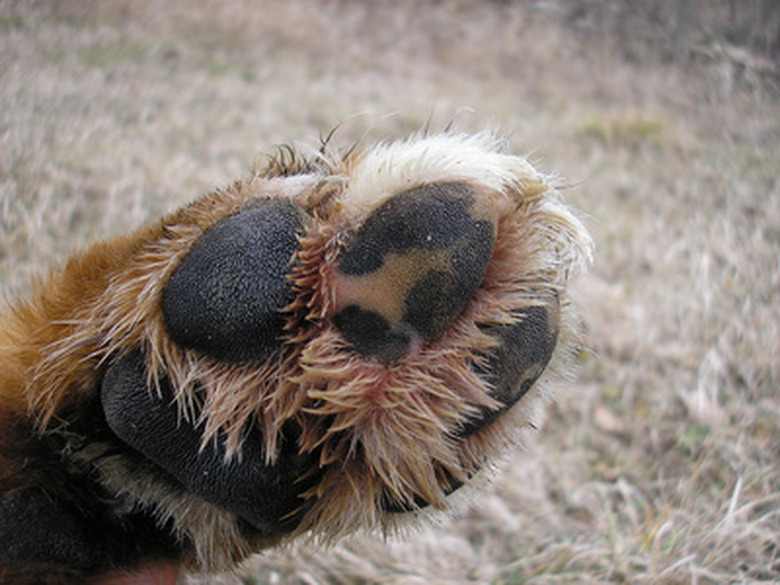Dogs And Gout
Canine gout is a rare form of gout. The disease generally appears in humans. Certain dog breeds are more susceptible to the disease, but it can be found in any dog. Canine gout can develop as a result of an injury or it can be genetically inherited. If found early, this disease is fully treatable.
Canine Gout
Canine Gout
Canine gout (Latin name: ascalcium circumscripta) is a rare form of the disease. Humans have gout more often than their canine companions. Gout is the result of a buildup of uric acid in the body that is then deposited into tissues and sometimes bones.
According to the website Gout-Aware, canine gout generally appears in a dog's paws, toes, joints and neck area. The appearance of gout takes the form of calcium-deposit lesions, according to the website. It can be a painful and sometimes fatal disease if not treated properly but, if caught early, the disease is manageable.
Susceptible Breeds
Susceptible Breeds
Dalmatians are the breed that is most susceptible to gout. Dalmatians are born with a defect in their kidneys and livers that can result in the production of insoluble uric acid, according to an article by orthopedic disorder and dog expert Fred Lanting on the website Doglogic.
Other breeds prone to the disease are German shepherds, Irish wolfhounds, English pointers, rottweilers and Labrador retrievers, according to the website Gout-Aware.
Symptoms
Symptoms
Symptoms of canine gout include a chalky, white substance oozing out of lesions, bloody urine, lumps in or bleeding of the paws, frequent urination in small amounts and lumps on the neck, according to the website Gout-Aware.
Some of these symptoms, such frequent urination, can be misdiagnosed as other ailments (in this case a urinary-tract infection) so it's important to have your dog examined by a licensed veterinarian before diagnosing your dog.
Medicinal Treatment
Medicinal Treatment
A drug called allopurinol (brand name Zyloprim) is the prescribed treatment for canine gout. It is in a class of drugs called xanthine oxidase inhibitors, which enable the body to process and excrete uric acid through urine.
As of May 2010, this drug has not been approved by the Food and Drug Administration for dogs, but veterinarians may prescribe it by labeling it as an extra-label drug, according to an article on the website Pet Education by Dr. Holly Nash, DVM. Vets can do this under the Medical Drug Use Clarification Act of 1996, which requires a veterinarian-client relationship prior to administering the pill.
Alternative Treatment
Alternative Treatment
Canine gout is sometimes treatable by a change in diet. Gout-Aware.com recommends a low purine diet, or one that is high in fat and low in protein. Foods should include milk, eggs, cheese, butter and fruit, according to the website.
Another alternative is a charcoal material (brand name Kremezin) that can help regulate your dog's metabolism.
Always check with your veterinarian before changing your pet's diet, medication, or physical activity routines. This information is not a substitute for a vet's opinion.
